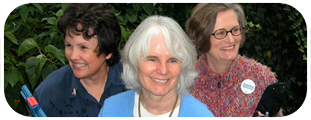NARAL Pro-Choice Washington is like a true friend who is there for us through good times and bad. They have a long-range strategy: they keep fighting for the building blocks of women's rights in relationship to their bodies. They think tactically: they have successfully created a grassroots network of pro-choice activists in Washington State, heavily focused on young women. They are able to respond in a crisis: they have a plan for activating people to resist the impending rash of right-wing judicial appointments.
Even when we are going about our lives, not paying much attention, they have our back. At a time when a woman's right to choose is under severe pressure from the religious right, the organization that NARAL has created and the strategies they have developed are more obviously important than at any time in decades.
NARAL Pro-Choice Washington was founded in 1975 to protect and expand reproductive freedom for women in this state. They have become the strongest grassroots network of pro-choice activists in the state. Their mission is:
To develop and sustain a constituency that uses the political process to guarantee every woman the right to make personal decisions regarding the full range of reproductive choices, including preventing unintended pregnancy, bearing healthy children, and choosing legal abortion.
Lucky for us, they are very good at what they do.
We have an interview with Karen Cooper, long-time Executive Director of NARAL Pro-Choice Washington after the fold.
Interview with Karen Cooper, Executive Director of NARAL Pro-Choice Washington
Q: What are NARAL's priorities right now?
KC: We have three priorities: 1) youth education programs, 2) dealing with Supreme Court appointments, and 3) getting the right people elected to State and National offices.
Q: Tell me about your organization and how you operate.
KC: We have close to 13,000 paid members and volunteers. There are 300,000 identified pro-choice voters in Washington and we have an email list of 20,000 whom we can activate for campaigns as we need to do so. Our job is to get people to do something they didn't wake up this morning deciding they were going to do. We do that by managing our lists. We know what we do and we spend massive resources keeping our lists up-to-date. We use those lists to contact people and ask them to write checks or come to a meeting or rally or vote for or against a candidate.
Q: I've noticed that you have a lot of young women involved in your organization. That's somewhat unusual for progressive organizations. How did you do that?
KC: In 1995, the Ms. Foundation did 25 focus groups around the country focused on women. We were invited to a briefing in Portland afterwards. What we learned made me determined to focus on recruiting and organizing young woman. For five years running we focused on youth programs and since that time it has snowballed.
Right now we are working to get the Healthy Youth Act through the Legislature. The bills aim to create standards for sexual health education that are comprehensive and medically accurate. We participated in sponsoring a Sex Education and Reproductive Rights Lobby Day on March 18th which drew 300 citizen lobbyists.
Q: How did NARAL become the key pro-choice organization?
KC: Some years ago, we realized that the environment had changed and people now have more money than time so we built an organization of paid staffers and we raise funds from our members to support it.
Q: Politically, what is your focus?
KC: Our main focus is at the state level. We will support Cantwell in 2006 and try to limit Reichert to one term but, other than that, we will focus on the state level.
We have an elaborate process of evaluating candidates. We endorse candidates we are favorable to and target those who oppose our policies. Then we send out mailings, make PAC contributions, provide financial support to individual candidates, and ask our members to work on the campaigns of those candidates we support.
Q: How do you work with other progressive organizations? I know that you personally support Progressive Majority because that's where I met you.
KC: Yes, I'm on their Board. But we work with a lot of progressive organizations. There is a big coalition of progressive organizations that meets monthly during campaign seasons, starting in late spring of election years. We share information on the candidates; we share our evaluations and endorsement lists and talk about the viability of the different candidates. We want people who can win.
Q: What do you think about the way that some Democrats, notably Hilary Rodham Clinton, have shifted the way they are talking about choice?
KC: Marcy Blume wrote a very good guest editorial in the PI that represents my feelings quite well.
In that editorial, she said:
"I believe it is a serious mistake to continue to stigmatize abortion and call it a "tragic" choice, one from which women are irreparably "damaged". Clearly our society must focus on education, self-help and concrete tools, such as effective contraception and medically accurate sex education, to help ensure that women do not become pregnant if they do not want to be. But if they do become pregnant, we need to understand that women view their abortions as a valid choice and a survival mechanism. We need respect, compassion and openness with the choice of abortion, not hate, violent threats and fundamentalist reprimands."
Thank you.
